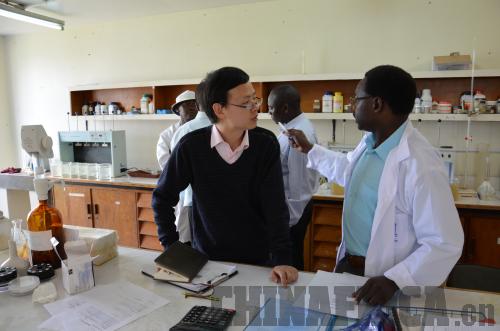|
 |
|
Dr. Wang Hongtao (left) in the lab of Nairobi City Water and Sewerage Company (HAIXING MENG) |
Safe water is a basic human need, but people in many countries don't have sufficient access to safe drinking water. Kenya is one of these countries. To provide people with safe and high quality drinking water, Nairobi City Water and Sewerage Co. (NCWSC), which provides water and sewerage services under the direction of the Nairobi City Council, has to constantly monitor and test the city's water quality, according to the company's official website.
NCWSC is trying new technology from China. From April 10 to 25, a technical delegation from Tongji University visited Kenya and ran chemical tests to examine water quality in the company's Ngethu Water Plant.
Located in Shanghai, China, Tongji University has cooperated before with NCWSC. This cooperation has been coordinated by the UNEP-China-Africa Cooperation Program on the Environment, which began in 2008 and is focused on the Development and Demonstration of New Technologies for Safe Water Supply. The main objective of the project is to share Chinese experience in water resource management with African countries to manage water problems caused by population growth, urbanization and mismanagement of water resources.
Building on the results of earlier cooperation with NCWSC, Tongji is now working on projects in Kenya that demonstrate rainwater collection and reuse, as well as drinking water treatment.
"The main problem with the water in Kenya is the high turbidity of the water, especially during the rainy season," said Wang Hongtao, the leading expert of the Tongji delegation. The delegation has proposed new methods to treat water to address this problem.
During this visit, a new chemical produced by Chinese companies was used by Tongji's experts as a water treatment agent.
In the laboratory tests, the chemical reduced water turbidity when used to treat water. This treatment will allow Kenya and other African countries to ensure the safety of drinking water supplies.
Nicholas Nyandiko, Quality Assurance Manager of NCWSC, is pleased with the results of the two weeks of chemical testing. "This is quite good. We can use some indicators from a water sample to give a final water quality evaluation with this test," he said.
Meanwhile, another 15 tons of testing and treatment chemicals have been shipped from China to Kenya, where experts are planning to conduct more tests with technical support from the Tongji delegation.
Philip Gichuki, Managing Director of NCWSC, is also quite happy with the technical support provided by the Tongji delegation. "We would like our cooperation to go further. Besides the current drinking water treatment project, we will also provide full support to the wetland waste water treatment demonstration project in Nairobi," he said.
As a cooperation partner of the project under the UNEP-China-Africa Cooperation Program on the Environment, Gichuki attended the program's Mid-term Review Meeting, which was held in Beijing in March 2013. While in China, he also visited Tongji University and a Shanghai water treatment plant. He said he was impressed by the city's construction and facilities, as well as the technology used for water treatment in China.
"I am quite happy with our cooperation so far," he noted.
While experts have finished the first phase chemical testing in Kenya, cooperation between Tongji and NCWSC will continue. CA
(Author Dr. Mohamed A.S. Abdel-Monem is the Regional Team Leader of Ecosystem Management in ROA/UNEP and the focal point for the Program from UNEP. Meng Haixing is Dr. Mohamed's assistant and special coordinator of the Program) |